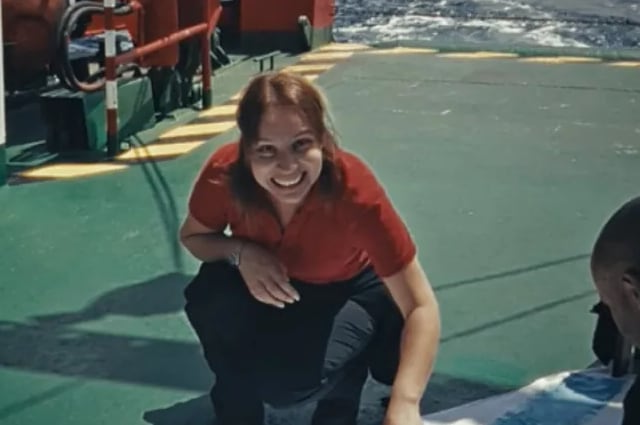Madrid, Spain – Her name was Maricarmen Fernández, a name rooted in the deep soil of Spanish tradition. But she was more than a name. She was a mother, a wife, and a woman who loved the sea. She ventured where few women dared, onto the deck of an oceanographic vessel, where whispered superstitions once claimed that women on ships brought bad luck. But no wave, no storm, no superstition could shake her determination. And yet, it wasn’t the sea that would take her. It was something far more cruel.
Maricarmen, like so many women before her, faced a darkness that even the open waters could not wash away: harassment in the workplace. On that ship, the García del Cid, her dreams met an untimely end. A man, a colleague, but more tragically, a distant relative, cast shadows upon her light.
A Silent Struggle Beneath the Surface
For two long years, she bore the weight of this burden. She sought refuge in the arms of therapy, wrestled with her own mind in the shadows of depression, and even learned the art of self-defense. Yet, when the world should have embraced her cries, it turned away. The Spanish National Research Council (CSIC), the institution meant to protect its own, placed her back on that very ship, alongside the man who had caused her so much pain. They saw her not as Maricarmen, a woman scarred by the injustice of her surroundings, but as MCFV, a cold string of initials lost in their records.
“If you do not find me, I threw myself overboard. I love you all,” she scribbled in her journal, as though the ink might bear witness to her truth when no one else would.
The Weight of a Woman’s Story
In the quiet, haunting moments of her story, one can hear the echoes of a thousand other Maricarmens, women who have lived and suffered in silence. Women whose voices trembled before they could rise, women whose spirits broke under the weight of disbelief. For Maricarmen, her husband José Ramón would later recall the subtle changes that spoke volumes. “Her smile had gone,” he said softly. “Her head hung low, and the brightness in her voice dimmed to a whisper.”
There is an ache in his words that transcends his own pain. It is the ache of a world that too often chooses not to see. “It’s easier for a woman to be seen as something shameful than as a victim,” he reflects, the truth of his words cutting through the air like a blade. For Maricarmen, for many like her, the fear was not only of the man who had hurt her but of a society too quick to cast stones.
A Family Left Searching for Answers
Her family, left with nothing but questions and a heart-wrenching silence, has not given up the search for truth. The justice system, in its cold bureaucracy, archived her case, filed it away in the distant corridors of a Valencia court. No calls. No condolences. Just silence.
But her story refuses to be silenced. Her sister-in-law, Maria José, remembers a time when Maricarmen still held onto hope. “She had a light in her voice when she spoke of returning to the sea,” she said. That light, however, was extinguished when reality struck once again. The walls of disbelief closed in, both at work and in the neighborhood where whispers turned to judgments.
The Sea’s Relentless Grip
Gonzo, the presenter of the television program “Salvados,” gave a platform to those left behind, those who still search for answers. He tried to speak with the crew of the García del Cid, but met only confusion, avoidance, and silence. Some truths are harder to face than others.
And then, there is Isabel Loureiro, a technician and delegate for Comisiones Obreras, who understands the fear that grips women in such spaces. “Once you speak up,” she says, “you lose control over everything that comes after.” She speaks for all the women who carry this weight, this fear, knowing that once a line is crossed, there is often no going back.
Amparo Burguillos, another voice in the story, knows this fear intimately. As the only woman on a ship with forty-three men, she stands firm in her choice to decide where she works. “I get to choose which ship I board. Maricarmen didn’t have that luxury.”
A Name That Deserves to Be Remembered
Maricarmen Fernández is more than the letters strung together in her name. She is more than the initials the CSIC now uses to distance themselves from her fate. She is a woman who loved, lived, and lost in the unforgiving currents of both the sea and society. Her story is not just hers—it belongs to the many women whose voices have been drowned out, who faced their fears in silence, and who now call out for justice.
Her family still waits, still hopes. José Ramón, still a father, still a husband, cannot rest until he knows what happened to his Maricarmen. He cannot tell his daughter that this is the future she must expect. Nor can he accept a world where his sons grow up to believe that men can commit such acts without consequence.
The Depths of a Lost Voice
As the waves continue to rise and fall, the silence that once surrounded Maricarmen’s story begins to break. Her voice, though stifled, rises once more through the testimony of those who loved her and the programs that refuse to let her be forgotten. The sea, vast and unyielding, holds its secrets, but it cannot hold the truth forever.
Let us not forget her. Let us remember Maricarmen Fernández, not as a victim, but as a woman who fought. A woman who deserved more than the world gave her. A woman who, even in her darkest moments, found the strength to speak her truth, if only through the pages of her journal.


